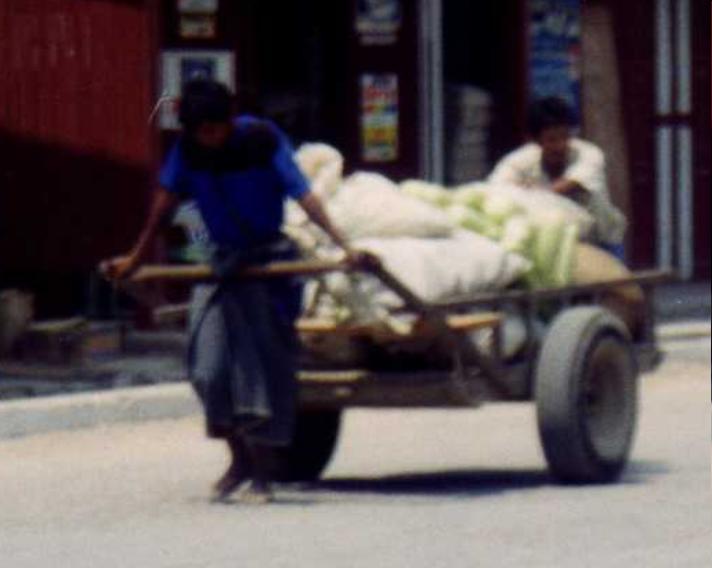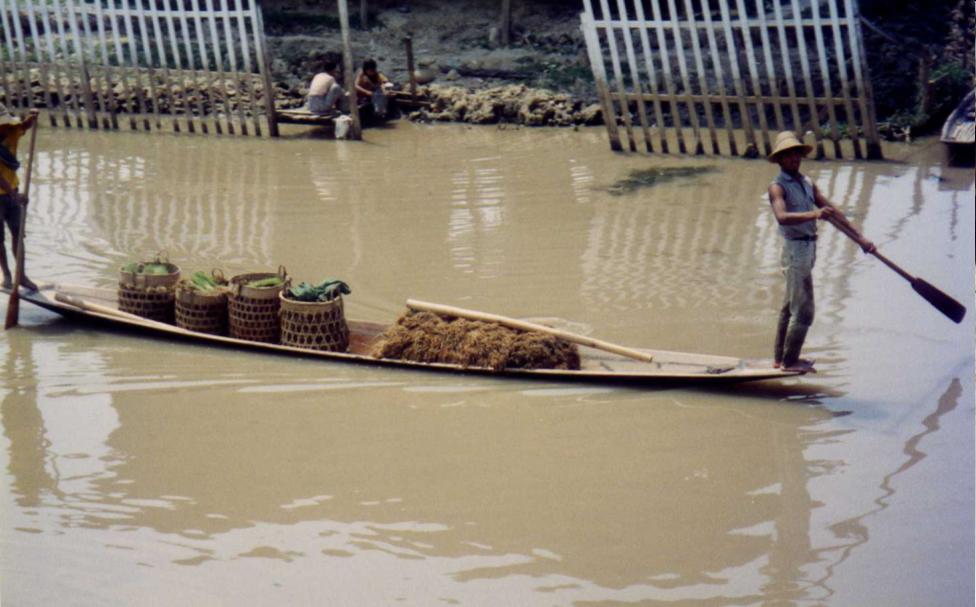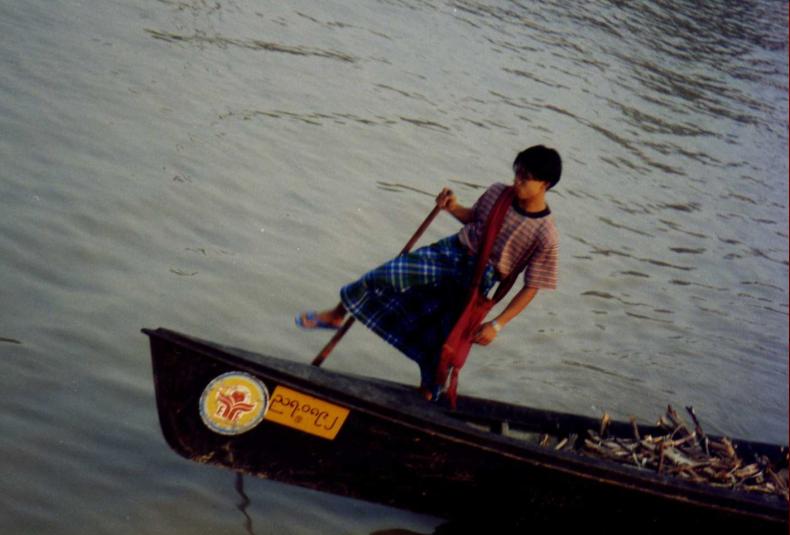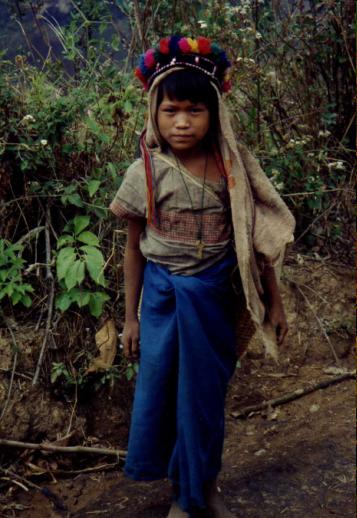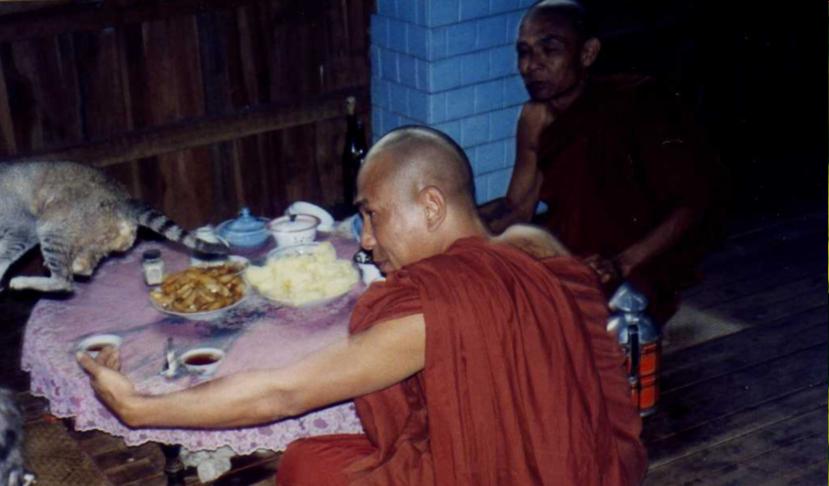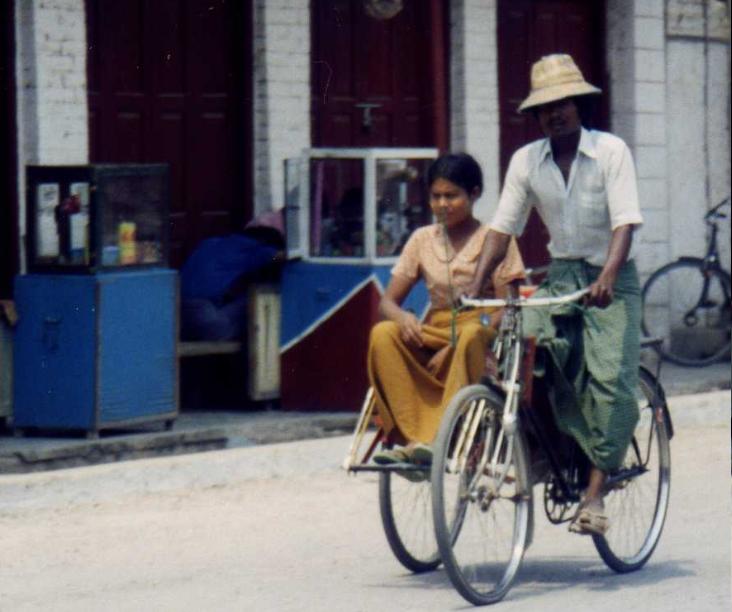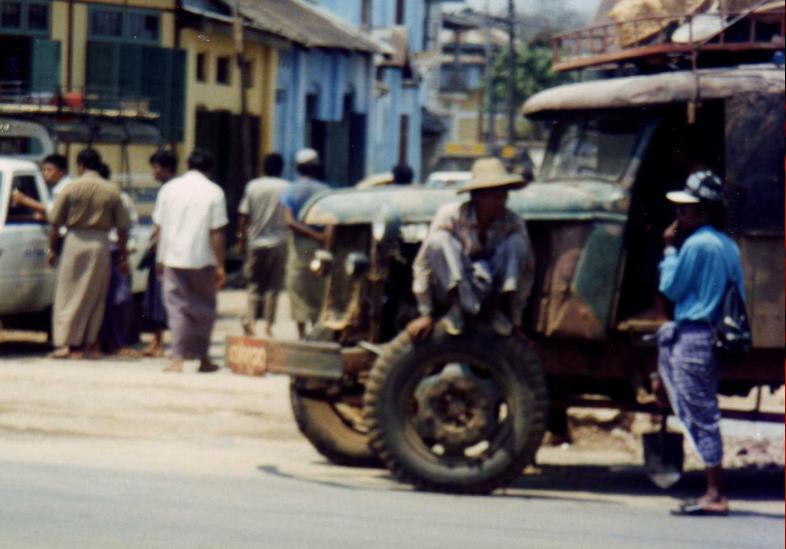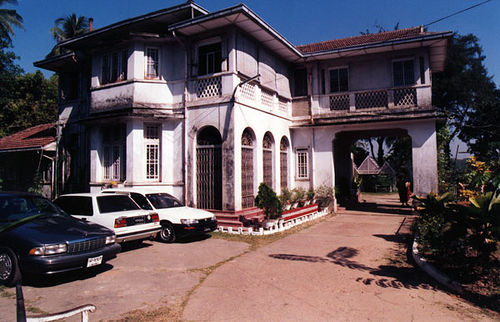|
Myanmar USA
ziehen Schiffe vor Birma ab
"insgesamt eine Schande für unseren
Berufsstand" schreibt Matussek. Man stelle sich vor, diese bemerkung hätte
er auf Tibet gemünzt:
Was ist passiert, daß jemand derart die Contenance verliert und aus dem Nähkästchen zu plaudern beginnt? Ausgerechnet Alice Schwarzer ist gegen den Strom geschwommen. "Warum Burma echte Freunde braucht" in der FAZ. Destabilisierung der Machthaber erkennt
sie als Ziel. Dabei trafen sich jetzt eben erst die verteidigungsminister
in der Shangri-La-Kobferenz, um über Hilfe für Myanmar zu beraten.
was Verteidigungsministe so oft und gerne machen. Gerne installiert
man Telekommunikationin
fremden Ländern, so wie ja auch die deutsche Telecom interessiert
an der Infrastruktur fremder Länder ist. Die Regierungen dieser Länder
mögen das allerdings manchmal nicht so gern, die eigene Infrastruktur
in andere Hände zu geben. Myanmar wird eben dies wiederum zum Vorwurf
gemacht.
War das nicht etwas anders? "Aus
Empörung über das Verhalten der burmesischen Militärführung
hat sich Frankreich geweigert, eine Schiffslieferung mit Hilfsgütern
für die Zyklon-Opfer in Burma (Myanmar) zu entladen."
Spendabel und ohne Verständnis
Derzeit wird die zhl der hilfsbedürftigen
in Mynmar ordentlich hochgerechnet: jetzt spricht man medial von
2,5 Millionen. Diesen bietet die Bundesregierung jetzt vier
Milionen Euro Soforthilfe an. Das ist nach Abzug von transport- und
verwaltungskosten schon mal -na grob geschätzt - eine Tagesportion
Reis pro Person. Von Beendigung des Boykotts und der Sanktionen, von Schuldenerlaß,
neuen Krediten der Weltbank und Ende der IWF-Einmischungen usw. war nicht
die Rede.
<Birma
befürchtet "Überfall"> Die hier erwähnten Kriegsschiffe
tauchten auch in einer Meldung
der SZ auf:
In DIESER Situation spricht Staatsminister Erler vor seinem Abflug nach Yangon davon, er wisse überhaupt nicht, warum nur die rgierung die Schiffe nicht ins Land lasse. Von der Erfindung von Handelsschiffen in der Seefahrt hat man in NATO-Staaten noch nie gehört, scheint es. Handelsgüter wie auch Hilfslieferungen sind durchaus in der Lage, z.B. in Thailand das beförderungsmittel zu wechseln - und sei es nur, um angeblich unberechtigte Befürchtungen zu zerstreuen. Die Bemerkung Erlers wurde im Deutschlandfunk am samstag um 17:00 Uhr gesendet - aus unerfindlichen Gründen ist die 17 Uhr-Sendung nicht als Trnsskript erhältlich. BOFAXE
Lutz Herden
Militärpolitische Interessen der bundesregierung
"De
Schutter: Durch die Öffnung der Marktwirtschaften
dieser Länder konnte man folgendes Szenario beobachten: Sie haben
ihre Subsistenzwirtschaft aufgegeben und stattdessen solche Cash Crops
angebaut. Damit wurde der heimische Markt abhängig von Importen; und
damit wiederum wurden sie sehr anfällig für die globale Entwicklung
der Lebensmittelpreise."
Wer oder was mag die Regierung Myanmars wohl dazu getrieben haben?
"Weltbank
verweigert Burmas Junta Kredite
Im Halbjahrestakt:
Der auf der Kommentarseite der WP stehende erste Kommentar eines Lesers lautet : "THERE IS A SPECIAL PLACE IN HELL WAITING
FOR THIS WAR MONGERING SLIME. THIS SICK EVIL MAN WHO OF COURSE HAS NEVER
FOUGHT HIMSELF REALLY GETS HIS THRILLS BY SENDING OTHER 'S OFF TO DIE FOR
HIS LUST FOR POWER AND BLOOD.WHAT A SAD PATHETIC UGLY MAN. "
"Dear Mr. Kristol, your above referenced comment on Burma requires an adequate response. Here it is: What about limited military actions, overt or covert, to eliminate the regime's instigators (Schreibtischtäter)? Couldn't such actions have a deterrent effect with regard to the next president and his administration? Best regards and auf Wiedersehen
at the next Nuremberg Tribunal
Das R2P - das Recht zu ...? Nein - die "Verantwortung" zu "schützen". Oder anders gesagt: die Aufhebung des Souveränitätsprinzips, wie es u.a. im Westfälischen frieden verankert worden war. Omnis nil sine pax. In Myanmar war es Zeit für eine neue Verfassung. In den vom Zyklon betroffenen Gebieten wurde die Abstimmung um zwei Wochen verschoben. Unsere Medien berichten, "international" sei die Führung Myanmars dazu aufgerufen worden, landesweit diese Abstimmung zu verschieben. Myanmars Einwohner, etwa 48 Millionen, verteilen sich auf einer Fläche von der doppelten Größe Deutschlands. In ihrer unglaublichen Brutalität beschloß die Junta also, daß eine Volksabstimmung in den nicht betroffenen Landesgebieten auch nicht betroffen sei. Ob sich die deutsche Bundesregierung wohl beim nächsten Oderhochwasser ähnlich hartherzig zeigt, wenn zugleich Wahlen in Bayern, BW, NRW, usw. anstehen? Obwohl die Russen und Chinesen uns auffordern, die Wahlen zu verschieben? Man weiß es nicht. Die Zeit wird es zeigen. Mindestens
11 Tote nach Tornados in den USA.
GFP betont zu Recht den völkerrechtswidrigen Charakter der derzeitigen Überlegungen, eine Strategie zum Regimewechsel. Zu bedenken ist nicht nur, daß europäische Staaten vor der Haustür zu kehren hätten. Auch daß geflissentlich "übersehen" wird, daß Myanmar keine Probleme mit Hilfslieferungen aus Indien, Bangla Desh und Thailand hat, also aus den Nachbarländern. Anders gesagt, es ist nicht einfach nur eine Vermutung, sondern nachweisbarer Fakt, daß die Auseinandersetzung nicht eine um Hunger und Elend, sondern um politischen Einfluß ist. Kleinere Pannen bei der Anti-Myanmar-Hetze:
Man beachte zudem die Fotostrecken - die Bilder passen nicht zum Text von Chaos und Inkompetenz. Myanmar - die
Geschichte der letzten Jahrzehnte
mehr China
Übel, wenn die Interviewpartner nicht gedrillt sind: "SPIEGEL ONLINE: Die Militärjunta wird angesichts der Katastrophe gezwungen sein, das Land zu öffnen. Sehen Sie darin auch eine Chance? Schoeneich: Eine Öffnung ist jedenfalls bitter nötig. Es müssen so schnell wie möglich Reis und Holzkohle ins Land, Ärzte und Nahrungsmittelcontainer. Wir müssen in dieser Notsituation von den Boykotts absehen, denen das Land ausgesetzt ist. Vielleicht springt aus diesem dramatischen Ereignis ein positiver Funke über. Vielleicht wären internationale Rettungsmaßnahmen eine Chance für Burma, weil das Land jetzt darauf angewiesen ist, sich zu öffnen. Dieses schreckliche Ereignis könnte einen politisch positiven Ausgang haben. Ich hoffe es zumindest. " Ist denn das erlaubt? Er wird nach Zwang auf die Junta gefragt - und antwortet "von Boykotts absehen". Als gehe es um die notleidenden Menschen und nicht darum politisch einen Fuß in die Tür zu bekommen. Dabei ist der Mann ja durchaus brav und will "einen politisch positiven Ausgang". Aber zunächst erwähnt er Reis und Holzkohle.
America, India and the outsourcing of imperial overreach "Access to India would enable the U.S. military 'to be able to touch the rest of the world' and to respond rapidly to regional crises", one U.S. Lt General told Ms MacDonald. And another senior officer argued that the U.S. Air Force "would benefit from having access closer to areas of instability (e.g. Central Asia, Southeast Asia and the Persian Gulf). India's well developed infrastructure could be useful for U.S. power projection into these areas". She (the author) stresses the reluctance
of Indian and U.S. officials to recommend or argue openly that the Indo-U.S.
military relationship be directed primarily against China. "A U.S. admiral
reasoned that … [t]he U.S. and India both view China as a strategic threat
… though we do not discuss this publicly". She quoted one American colonel
as warning against portraying India as a counter to China in U.S. strategy:
"… Such a rationale for the relationship will make the task of selling
the Indo-U.S. relationship to the Indian public exceedingly difficult."
At the same time, China is the key. "
By F. William Engdahl *
There are facts and then there are facts. Take the case of the recent mass protests in Burma or Myanmar depending on which name you prefer to call the former British colony. First it’s a fact which few will argue that the present military dictatorship of the reclusive General Than Shwe is right up there when it comes to world-class tyrannies. It’s also a fact that Burma enjoys one of the world’s lowest general living standards. Partly as a result of the ill-conceived 100% to 500% price hikes in gasoline and other fuels in August, inflation, the nominal trigger for the mass protests led by Saffron-robed Buddhist monks, is unofficially estimated to have risen by 35%. Ironically the demand to establish “market” energy prices came from the IMF and World Bank. The UN estimates the population of some 50 million inhabitants spends up to 70% of their monthly income on food alone. The recent fuel price hike makes matters unbearable for tens of millions. Myanmar is also deeply involved in the world narcotics trade, ranking only behind Hamid Karzai’s Afghanistan as a source for heroin. As well, it is said to be Southeast Asia’s largest producer of methamphetamines. This is all understandable powder to unleash a social explosion of protest against the regime. It is also a fact that the Myanmar military junta is on the Hit List of Condi Rice and the Bush Administration for its repressive ways. Has the Bush leopard suddenly changed his spots? Or is there a more opaque agenda behind Washington’s calls to impose severe economic and political sanctions on the regime? Here some not-so-publicized facts help. Behind the recent CNN news pictures of streams of saffron-robed Buddhist Monks marching in the streets of the former capital city Rangoon (Yangon) in Myanmar—the US government still prefers to call it by the British colonial name, Burma—calling for more democracy, is a battle of major geopolitical consequence. The major actors The tragedy of Burma, whose land area is about the size of George W. Bush’s Texas, is that its population is being used as a human stage prop in a drama which has been scripted in Washington by the National Endowment for Democracy (NED), the George Soros Open Society Institute, Freedom House and Gene Sharp’s Albert Einstein Institution, a US intelligence asset used to spark “non-violent” regime change around the world on behalf of the US strategic agenda. Burma’s “Saffron Revolution,” like the Ukraine “Orange Revolution” or the Georgia “Rose Revolution” and the various Color Revolutions instigated in recent years against strategic states surrounding Russia, is a well-orchestrated exercise in Washington-run regime change, down to the details of “hit-and-run” protests with “swarming” mobs of Buddhists in saffron, internet blogs, mobile SMS links between protest groups, well-organized protest cells which disperse and reform. CNN made the blunder during a September broadcast of mentioning the active presence of the NED behind the protests in Myanmar. In fact the US State Department admits to supporting the activities of the NED in Myanmar. The NED is a US Government-funded “private” entity whose activities are designed to support US foreign policy objectives, doing today what the CIA did during the Cold War. As well the NED funds Soros’ Open Society Institute in fostering regime change in Myanmar. In an October 30 2003 Press Release the State Department admitted, “The United States also supports organizations such as the National Endowment for Democracy, the Open Society Institute and Internews, working inside and outside the region on a broad range of democracy promotion activities.” It all sounds very self-effacing and noble of the State Department. Is it though? In reality the US State Department has recruited and trained key opposition leaders from numerous anti-government organizations. It has poured the relatively huge sum (for Myanmar) of more than $2.5 million annually into NED activities in promoting regime change in Myanmar since at least 2003. The US regime change, its Saffron Revolution, is being largely run according to informed reports, out of the US Consulate General in bordering Chaing Mai, Thailand. There activists are recruited and trained, in some cases directly in the USA, before being sent back to organize inside Myanmar. The USA’s NED admits to funding key opposition media including the New Era Journal, Irrawaddy and the Democratic Voice of Burma radio. The concert-master of the tactics of Saffron monk-led non-violence regime change is Gene Sharp, founder of the deceptively-named Albert Einstein Institution in Cambridge Massachusetts, a group funded by an arm of the NED to foster US-friendly regime change in key spots around the world. Sharp’s institute has been active in Burma since 1989, just after the regime massacred some 3000 protestors to silence the opposition. CIA special operative and former US Military Attache in Rangoon, Col. Robert Helvey, an expert in clandestine operations, introduced Sharp to Burma in 1989 to train the opposition there in non-violent strategy. Interestingly, Sharp was also in China two weeks before the dramatic events at Tiananmen Square. Why Myanmar now? A relevant question is why the US Government has such a keen interest in fostering regime change in Myanmar at this juncture. We can dismiss rather quickly the idea that it has genuine concern for democracy, justice, human rights for the oppressed population there. Iraq and Afghanistan are sufficient testimony to the fact Washington’s paean to Democacy is propaganda cover for another agenda. The question is what would lead to such engagement in such a remote place as Myanmar? Geopolitical control seems to be the answer. Control ultimately of the strategic sea lanes from the Persian Gulf to the South China Sea. The coastline of Myanmar provides naval access in the proximity of one of the world’s most strategic water passages, the Strait of Malacca, the narrow ship passage between Malaysia and Indonesia. The Pentagon has been trying to militarize the region since September 11, 2001 on the argument of defending against possible terrorist attack. The US has managed to gain an airbase on Banda Aceh, the Sultan Iskandar Muda Air Force Base, on the northernmost tip of Indonesia. The governments of the region, including Myanmar, however, have adamantly refused US efforts to militarize the region. A glance at a map will confirm the strategic importance of Myanmar. The Strait of Malacca, linking the Indian and Pacific Oceans, is the shortest sea route between the Persian Gulf and China. It is the key chokepoint in Asia. More than 80% of all China’s oil imports are shipped by tankers passing the Malacca Strait. The narrowest point is the Phillips Channel in the Singapore Strait, only 1.5 miles wide at its narrowest. Daily more than 12 million barrels in oil supertankers pass through this narrow passage, most en route to the world’s fastest-growing energy market, China or to Japan. If the strait were closed, nearly half
of the world's tanker fleet would be required to sail further. Closure
would immediately raise freight rates worldwide. More than 50,000 vessels
per year transit the Strait of Malacca. The region from Maynmar to Banda
Aceh in Indonesia is fast becoming one of the world’s most strategic chokepoints.
Who controls those waters controls China’s energy supplies.
That strategic importance of Myanmar has not been lost on Beijing. Since it became clear to China that the US was hell-bent on a unilateral militarization of the Middle East oil fields in 2003, Beijing has stepped up its engagement in Myanmar. Chinese energy and military security, not human rights concerns drive their policy. In recent years Beijing has poured billions
of dollars in military assistance into Myanmar, including fighter, ground-attack
and transport aircraft; tanks and armored personnel carriers; naval vessels
and surface-to-air missiles. China has built up Myanmar railroads and roads
and won permission to station its troops in Myanmar. China, according to
Indian defense sources, has also built a large electronic surveillance
facility on Myanmar’s Coco Islands and is building naval bases for access
to the Indian Ocean.
In fact Myanmar is an integral part of
what China terms its “string of pearls,” its strategic design of establishing
military bases in Myanmar, Thailand and Cambodia in order to counter US
control over the Strait of Malacca chokepoint. There is also energy on
and offshore of Myanmar, and lots of it.
US-backed regime change in Myanmar together
with Washington’s growing military power projection via India and other
allies in the region is clearly a factor in Beijing’s policy vis-à-vis
Myanmar’s present military junta. As is often the case these days, from
Darfur to Caracas to Rangoon, the rallying call of Washington for democracy
ought to be tasted with at least a grain of good salt.
MAI-Fotos aus Myanmar
Was man auch wissen sollte: - Mönche im europäischen Sinne sind die buddhistischen Mönche nicht. Der Buddhismus sieht - möglichst mehrfach - ein Ablegen der weltlichen Lebensweise bei gläubigen Buddhisten vor. heißt: Es gibt nicht die uns bekannte Vorstellung, ein Mönch weihe diesem "Lebensstil" seine gesamte Zukunft. UNd umgekehrt: ein Mönch ist somit Teil der gesellschaft und nicht allein in asketische Religiosität versunken. Dieser Gedanke ist, freundlich formuliert, ausbaubar. - die Herkunft von Drogen aus dem sog. "Goldenen Dreieck" ist unbestritten. Nur bedeutet sie nicht, daß der Drogenanbau und -handel in der Hand der Militärs liege, sondern das exakte Gegenteil: die Karen und andere aufständische Stämme/Sezessionisten haben mittels Drogen die Mittel, ihren Kampf zu finanzieren. Im Norden entstanden einige MAI-Fotos, wo uns stolz erklärt wurde, daß die zu besichtigenden teeplantagen umgewidmete Mohnfelder waren - seitdem dort die Macht der zentralregierung galt. Andere Sichtweisen und neuere Fakten seien durch diese bemerkungen nicht ausgeschlossen. - ein bitterarmes Land unter Bdingungen
von Embargo und IWF-Knute (siehe die geforderten Preiserhöhungen)
nur nach dem lebensstandard zu bemessen, ist vergleichbar damit, Deutschland
nach der religiosität seiner Bewohner und damit nach der seelischen
Ausgeglichenheit der Deutschen zu bemessen. Das "asiatische Lächeln"
hat zumindest außerhalb Yangons noch Echtheit und ist nicht mit Kauf/Verkauf
verbunden.
|
